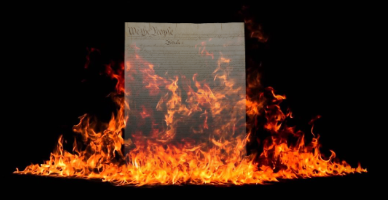
Historically, of course, the State arose as an expression of the personal power of the ruler to impose their will on a population.
But that idea of the State was made obsolete thousands of years ago.
Though it is still inexplicably popular.
As I use the term on this site, “the State” refers to the organization that manages the collective assets and structures the collective activities of a population.
Which may seem to be an odd way to think of it for an anarchist, I know. This definition means that “the State” in some form is necessary for any collective activity, and the stereotype of an anarchist in U.S. culture is knee-jerk opposed to “the State” as an idea. Nuance is the enemy of stereotypes.
So, as an expression of collective will, what is a State for?
Here are the functions that a State performs, roughly in order of importance:
- defend its territories and its population
- maintain its collective infrastructure
- pursue its collective projects
Each of these depends on the previous; for example, you cannot pursue collective projects if your infrastructure doesn’t function and there’s no point maintaining the infrastructure if a foreign army is stomping through your cities.
A State that fails at any of these isn’t worth preserving.
But how do we judge a State that isn’t failing, to decide if it’s worth keeping around?
The criteria above are all objective measures; you don’t use your personal ideology to evaluate whether a State is succeeding at being a State. These are basically questions of whether the State is doing its job, and you don’t need ideology for that.
You use your ideology to decide whether the cost of having that State is worth it to you.
A State is the collective enterprise of a population, so it’s fair to ask if it’s worth it even when it’s successful as a State. This is a personal decision, and the criteria involved and their importance are personal. Everybody makes their own decision on this.
For me, that list would be something like:
- adherence to the written rules by which it is chartered
- accurate expression of the will of its people
- minimal intrusion on the private lives of the population
- a minimum standard of living for the whole population
And these have to be judged over time: preparation to be successful in the future is necessary. So not preparing today for problems that will arise in the future is failure too.
To be worth having, a State has to meet these criteria or at least demonstrate that is has the capability to meet them; if it doesn’t, it’s not really better than the alternative of having no State.
This is a minimum, of course.
I’d give extra credit for a State that fit my own personal aesthetic and cultural preferences after it met these minimums.
But that’s never been an issue so far, sadly.
So, take a look at the State where you live.
Does it meet the basic criteria for being a successful State? Has it at least demonstrated that it can?
Think on your own ideology, and come up a list of requirements for how you’d judge your State based on that.
Does it meet whatever basic criteria you’d choose to decide if it’s worth keeping around? Has it at least demonstrated that it can?
This is a decision each person has to make for themselves.
I’d argue that the U.S. has increasingly failed to maintain its infrastructure and its projects, though it’s not really threatened so it’s done fine at defense. So the U.S. is, or is becoming, a failed State.
It does a poor job of staying within its rules, and does not heed the will of its people; it intrudes deeply into the lives of the people, and does not guarantee a decent life to its population. It was failing at all of these things well before Trump was inaugurated in January, of course, but it has gotten markedly worse at all of them in his first hundred days.
It has shown itself to be incapable of meeting even these minimal standards and we would, in the long term, be better off without it.
Because then we could focus on building something better.
- Bad Politics: Welcome To The Jungle Primary - 2026-02-16
- AIpocalypse: Generative AI Cannot Be Reliable - 2026-02-13
- C’mon Democrats: Zero Votes For Fascism - 2026-02-11
- Tax Everyone: No More Religious Exemptions
- You Should Read This: We Should Talk About The Morality of Political Violence
- “History And Tradition”: If We’re Changing Legal Interpretation, Let’s Not Make It Worse
- Framing For Goblins: Say Your Right Words
- Self-Interesting: Fairness And Equality Are Rational Choices
